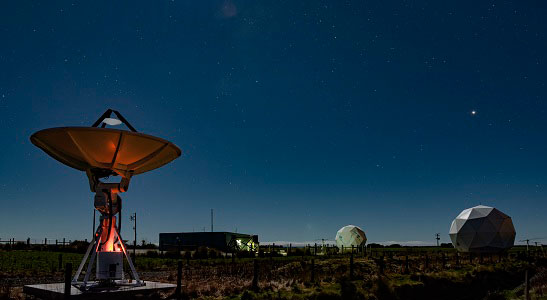Space-related opportunities in New Zealand
Space is of immense strategic importance around the world, and New Zealand’s unique location and conditions make it an attractive choice for an increasing amount of space activity.
On this page

The space economy and New Zealand
The global space economy is a multi-billion dollar business that's evolving rapidly due to advances in technology — such as those that lower the costs of building satellites. We rely on data from satellites to make our world a better and safer place, and to provide services we all benefit from, including in banking, transport, telecommunications, security, and climate change monitoring.
What's happening now
Rocket Lab, a US company with a New Zealand subsidiary, has established the world’s first private orbital launch range located on the Mahia Peninsula. It conducts frequent commercial launches carrying satellites.
Other space activity in New Zealand includes:
- The Xerra Earth Observation Institute(external link) (formerly the Government-funded Centre for Space Science Technology (CSST)), based in Alexandra, which has plans to develop satellite data products to drive regional economic growth.
- NASA's super-pressure balloon programme launching from Wanaka in the South Island.
A November 2019 report that MBIE commissioned from Deloitte shows the New Zealand space sector was worth $1.69 billion in 2018-19 and supported 12,000 jobs. The report’s key findings are that New Zealand’s space sector:
-
Is ‘New Space’-driven, characterised by a mix of start-up and well-established entrepreneur-driven and privately-funded space companies
-
Has strong space manufacturing and space applications sub-sectors, and cutting-edge research and development capability within several universities across the country; and
-
Draws on local as well as international talent, and has strong connections with the global space economy.
New Zealand Space Sector: Its value, scope and structure [PDF, 1.9 MB]
An earlier report, which MBIE commissioned from Sapere Research Group in 2016, estimated the economic impact of the development of a rocket launch industry in New Zealand:
Economic Impact Analysis of the Development of a Rocket Launch Industry (June 2016) [PDF, 1 MB]
The future
We’re interested in advancing areas where New Zealand has existing strengths — using and applying space-based data in areas such as agri-technology, hazard management, oceanography and meteorology.
We also intend to grow our satellite design and manufacturing capability and our space science, technology and engineering research activity.
Why New Zealand
We want everyone to take advantage of the opportunities that New Zealand's participation in the global space economy has to offer.
Great location
New Zealand has some of the largest selection of launch angles (azimuths) for rocket launches in the world. Our remote location is also an advantage, giving us clear skies and seas, and relatively low levels of air traffic.
This creates opportunities for frequent launches — a game-changer for a world that has an insatiable demand for the data captured by satellites — and for testing new technologies. Enhanced connectivity and skilful management of the earth’s resources is more possible than ever.
Business-friendly
We have a reputation for being business-friendly. New Zealand has been ranked the top country in the world for doing business in the World Bank’s 2019 Economy rankings.
Doing Business website — Economy rankings(external link)
Our government is confidently backing entrepreneurs already working in space-related activities, and welcomes others to join our emerging space industry. This aligns to our goal to develop New Zealand as a hub for high-value, knowledge-intensive businesses through innovation and research and development (R&D).
Enabling a future-focused regulatory regime
Our regulatory regime governing outer space and high-altitude activities is informed by international best practice, and has been developed to meet the requirements of New Zealand’s emerging industry. Our approach encourages space activity, and minimises risks to public safety, national security and the environment.
The regime is future-proofed to be flexible and pragmatic enough to respond to rapid advances in space technologies, space applications and related market demand. We're one of the first countries to develop laws covering non-rocket propelled activity in high altitudes, such as balloons.
Our laws minimise unnecessary prescription, by including detailed requirements in regulation. Compliance costs are also minimised, by enabling overseas licences to satisfy New Zealand requirements.
See Our regulatory regime for more information.
Support for innovation and R&D
We want to attract entrepreneurs, researchers, international businesses and investors. We're particularly interested in advancing areas where New Zealand has existing strengths — space-based data applied to agri-technology, hazard management, oceanography and meteorology.
Xerra Earth Observation Institute will be active in this area, helping New Zealand’s businesses to access space-based data to develop satellite data products and solutions.
A Tax Incentive is now available to businesses conducting eligible research and development in New Zealand.
See the R&D Tax Incentive page for more information.
Research and development
There are opportunities to grow our satellite design and manufacturing capability and our space science, technology and engineering research activity. Some of our universities are actively involved in space-related research. Government agencies, such as Callaghan Innovation, are also involved in encouraging research and development.
Callaghan Innovation website(external link)
Funding opportunities
There are a wide range of science and innovation funding streams within government.
For instance, MBIE recently announced the successful proposals for our second dedicated investment in space research through the $3 million Catalyst: Strategic Space call, which will accelerate the development of space sector capability in New Zealand by building partnerships with leading international space organisations.
The six successful projects were recommended by a combined international and domestic panel of experts, and will each receive up to $500,000 over three years (excluding GST). We received 29 proposals in total from a wide variety of organisations, showing a promising foundation for future initiatives.
See Catalyst: Strategic – Space 2019 for more information on the successful proposals and see Funding information and opportunities for more information on our other funding opportunities.
MethaneSAT mission

As part of the global effort to combat climate change, MBIE is participating in the MethaneSAT mission. It’s New Zealand’s first official space mission as a country.

